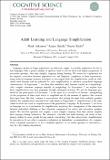Files in this item
Adult learning and language simplification
Item metadata
| dc.contributor.author | Atkinson, Mark | |
| dc.contributor.author | Smith, Kenny | |
| dc.contributor.author | Kirby, Simon | |
| dc.date.accessioned | 2020-11-02T10:30:03Z | |
| dc.date.available | 2020-11-02T10:30:03Z | |
| dc.date.issued | 2018-12-06 | |
| dc.identifier | 270928767 | |
| dc.identifier | 0263b181-cd43-4220-bbd7-37d297fc9cb9 | |
| dc.identifier | 000453527500014 | |
| dc.identifier | 85055042367 | |
| dc.identifier.citation | Atkinson , M , Smith , K & Kirby , S 2018 , ' Adult learning and language simplification ' , Cognitive Science , vol. 42 , no. 8 , pp. 2818-2854 . https://doi.org/10.1111/cogs.12686 | en |
| dc.identifier.issn | 0364-0213 | |
| dc.identifier.uri | https://hdl.handle.net/10023/20873 | |
| dc.description | Mark Atkinson was supported by an Arts & Humanities Research Council PhD Studentship (AH/K503010/1). | en |
| dc.description.abstract | Languages spoken in larger populations are relatively simple. A possible explanation for this is that languages with a greater number of speakers tend to also be those with higher proportions of non-native speakers, who may simplify language during learning. We assess this explanation for the negative correlation between population size and linguistic complexity in three experiments, using artificial language learning techniques to investigate both the simplifications made by individual adult learners and the potential for such simplifications to influence group-level language characteristics. In Experiment 1, we show that individual adult learners trained on a morphologically complex miniature language simplify its morphology. In Experiment 2, we explore how these simplifications may then propagate through subsequent learning. We use the languages produced by the participants of Experiment 1 as the input for a second set of learners, manipulating (a) the proportion of their input which is simplified and (b) the number of speakers they receive their input from. We find, contrary to expectations, that mixing the input from multiple speakers nullifies the simplifications introduced by individuals in Experiment 1; simplifications at the individual level do not result in simplification of the population's language. In Experiment 3, we focus on language use as a mechanism for simplification, exploring the consequences of the interaction between individuals differing in their linguistic competence (as native and non-native speakers might). We find that speakers who acquire a more complex language than their partner simplify their language during interaction. We ultimately conclude that adult learning can result in languages spoken by more people having simpler morphology, but that idiosyncratic simplifications by non-natives do not offer a complete explanation in themselves; accommodationby comparatively competent non-natives to less competent speakers, or by native speakers to non-nativesmay be a key linking mechanism. | |
| dc.format.extent | 37 | |
| dc.format.extent | 306358 | |
| dc.language.iso | eng | |
| dc.relation.ispartof | Cognitive Science | en |
| dc.subject | Language evolution | en |
| dc.subject | Language complexity | en |
| dc.subject | Cultural transmission | en |
| dc.subject | Adult learning | en |
| dc.subject | Linguistic accommodation | en |
| dc.subject | Foreigner-directed speech | en |
| dc.subject | BF Psychology | en |
| dc.subject | LC5201 Education extension. Adult education. Continuing education | en |
| dc.subject | NDAS | en |
| dc.subject.lcc | BF | en |
| dc.subject.lcc | LC5201 | en |
| dc.title | Adult learning and language simplification | en |
| dc.type | Journal article | en |
| dc.contributor.institution | University of St Andrews. School of Management | en |
| dc.identifier.doi | https://doi.org/10.1111/cogs.12686 | |
| dc.description.status | Peer reviewed | en |
This item appears in the following Collection(s)
Items in the St Andrews Research Repository are protected by copyright, with all rights reserved, unless otherwise indicated.

